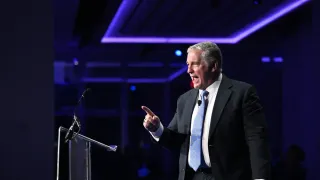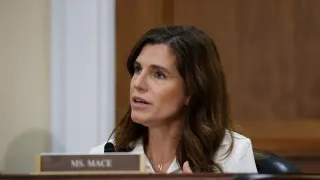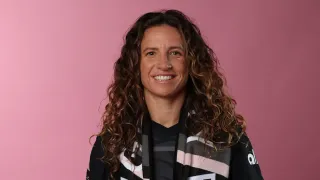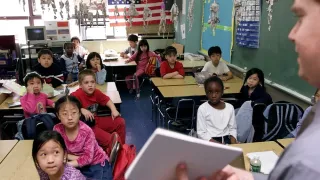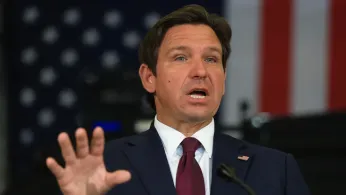
3 hours ago
Florida’s High School Culture War: DeSantis, Turning Point USA, and What’s at Stake for Queer Students
READ TIME: 3 MIN.
If you thought the Florida culture wars had peaked, buckle up: Governor Ron DeSantis just announced his boldest move yet—a partnership with the ultra-conservative Turning Point USA, with the goal of establishing a chapter in every single high school statewide. The announcement, made at New College of Florida—formerly a haven for queer and progressive students—was blunt: any school district that dares to “stand in the way” of a Turning Point chapter will feel the full force of Tallahassee’s wrath, with DeSantis promising districts would receive a “nastygram” and the state would “drop the hammer” on dissenters .
For queer students and their allies, the implications are far more than academic. Turning Point USA and its late founder, Charlie Kirk, have a well-documented history of anti-LGBTQ+ rhetoric. Kirk, killed earlier this year during one of his debate events, was notorious for inflammatory statements—most recently, blaming “too many” mass shootings on transgender people, a claim widely condemned for its inaccuracy and bigotry . The group has consistently opposed queer-inclusive policies and curricula, painting LGBTQ+ rights as a “threat” to American values.
DeSantis’ announcement lands amid a broader campaign to reshape Florida’s public education system—one that has already seen books on gender and sexuality vanish from school libraries, and LGBTQ+ inclusive clubs face heightened scrutiny. New College of Florida, the site of the governor’s announcement, was itself transformed from a progressive enclave to a laboratory for conservative educational experiments after DeSantis installed a new board of trustees tasked with purging “woke” influences .
The message to queer students is clear: your rights, your visibility, even your right to form supportive communities, are on the line. “We want to make sure that all high schools in Florida, anybody in a high school that wants to start a state Club America chapter will be able to do so. There shouldn’t be any impediments to that, and certainly no discrimination. We’re not going to allow that,” DeSantis declared, framing the push as an anti-discrimination effort—but notably, only for conservative groups .
Education Commissioner Anastasios Kamoutsas echoed the tough talk, promising to treat districts blocking Turning Point chapters with the zeal of a “tough-on-crime prosecutor” .
Turning Point USA isn’t your average after-school group. Backed by billionaire donors, the organization has become a fixture at right-wing rallies and college campuses, known for provocations and a brand of conservatism that often targets LGBTQ+ communities. The group’s “Professor Watchlist” has been accused of intimidating queer and progressive educators, and its national conferences have hosted speakers who promote anti-transgender legislation and rhetoric .
While DeSantis claims the partnership is about free expression, critics see a double standard: queer-straight alliances and similar support groups have faced bureaucratic hurdles and outright bans in Florida schools, while Turning Point is being handed the keys to every campus. There’s a grim irony in DeSantis warning against “discrimination” as his administration champions policies that have rolled back queer rights statewide.
After Kirk’s death—he was shot by a man who reportedly texted a transgender romantic interest about the killing—interest in Turning Point chapters reportedly “skyrocketed,” according to DeSantis. “You’re starting to see more young people take an interest and be educated, and now they want to get involved,” he said, casting the group’s rise as organic, even as the state machinery clears the path .
For Florida’s queer youth, the partnership is more than policy—it’s a signal that their schools may become less safe, less welcoming, and less affirming. Many LGBTQ+ students already face bullying and discrimination; the promise of state-backed, right-wing organizing in every school raises fears of further marginalization. The risk isn’t hypothetical: national data shows that anti-LGBTQ+ rhetoric and policies correlate with increased harassment and mental health struggles among queer youth.
Still, the queer community is nothing if not resilient. Across the state, LGBTQ+ organizations are mobilizing, offering resources, and preparing legal strategies to ensure that queer students retain the right to organize their own clubs and find support in hostile environments. National groups are watching closely, aware that Florida often sets the tone for other states.
There’s a growing movement to remind students—and school districts—that the First Amendment protects all voices, not just those favored by the governor’s office. “If Turning Point chapters are entitled to space and support in public schools, so are GSAs and queer student groups,” said one local advocate. The coming months will test both the resolve of Florida’s queer youth and the state’s commitment to pluralism.
As the battle for Florida’s classrooms intensifies, one thing is certain: queer students are not backing down, and neither are their allies. The rainbow may be under siege, but it’s never been brighter—or more necessary—than now.

